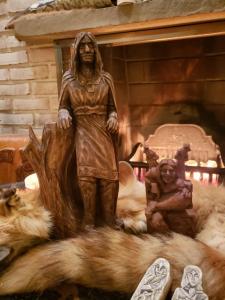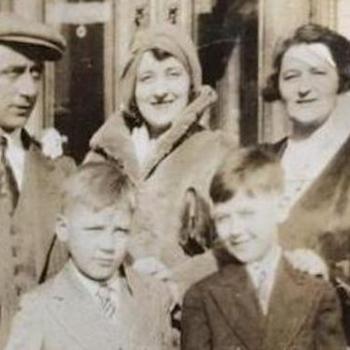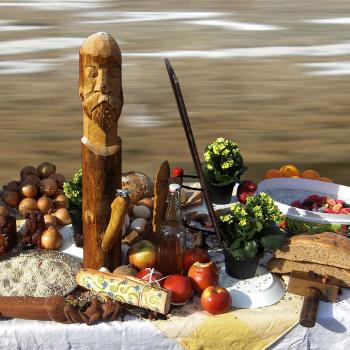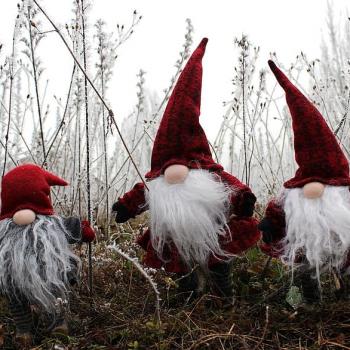Some call it their hearth cult, others call them patrons or fulltruis. As for me, my “Greatest Hits: Now That’s Who I Call Deity!” collection is my God Squad. I’ve worked with them for a long, long time. Decades of pestering (and being pestered) has forged a bond that thrives on irreverence. The casual (and often crude) manner in which I refer to the gods might raise a few eyebrows from other pagans and heathens, but I promise that I’m only flippant with the gods to whom I’m closest. Immature nicknames and snackrifices seem sacrilegious on the surface, but they’re practices that have developed organically over the course of 30-odd years of devotion.
I grew up heathen, but it wasn’t until I was 18ish that I became more active in my worship. In the last 20 years, I’ve evolved from an “unchurched” family-flavored heathen to an active member of my kindred (and my “in-law” kindred. Families are complex!) and the Northeast Heathen Community. So here’s a hot take on how you can build your hearth cult/relationships/God Squads from someone who’s been at it for eons.

Why “Hearth Cult”?
The gifting cycle is the foundation for building relationships. Before you worry about creating an altar or vé to a deity/ies, I suggest getting to know them a little better so that you know how to make a sacred space that makes everyone happy. The Nordic/Germanic gods, in my experience, are more like our kin and family than some distant Grand Poombah. In Ye Olde Days™, hospitality wasn’t shown by lavish, elaborate parties and gifts; hospitality was as simple as welcoming someone in from the cold and giving them ale and stew. According to my (very old school heathen) grandfather, the pre-Christian Scandinavians were simple people, mostly farmers living in a harsh environment that didn’t allow for a whole lot of fancy finery. Practicality was more important than luxury, and a lot of this mindset is still visible today in the stereotypical clean, minimalist decor and style of modern Scandinavians.
Practicality was reflected in their religious practices: because farmsteads were scattered and winter weather made travel difficult and dangerous, faith was often defined by individual families. Each family and each region had their own way of doing things, each homestead honoring their own selection of gods and goddesses. More often than not, the act of worship was centered around the hearth of the home. It was the busiest part of the house, so it was the natural focal point for honoring their deities.
Modern heathens more or less follow this mindset: practicality wins every time, and sincerity is more important than elaborate setups. We call our “congregations” kindreds or tribes because they are our chosen family. One kindred’s practices will differ from another’s, and there will be very different terms and concepts employed among different geographical regions. This means there’s no one right way to do things. Hel, even the things I share here are based on my own experiences, studies, upbringing, and interactions with other heathens. There’s no rubric for heathen worship, just commonalities such as passing a horn, emphasizing hospitality and community, and a penchant for mead.
Where to Start?
The Norse gods are often regarded as kin. The sagas and lore are full of stories about them wandering around Midgard and interacting with humans. They’re imperfect beings, and they’re not afraid to get their hands dirty. They are, literally and figuratively, pretty down to earth. This takes a lot of pressure off of the novice who wants to get to know them! In my experience, both in my own personal dealings and in observing others, these gods and goddesses aren’t going to get pissy if the “wrong” kind of offering is made or the “right” words aren’t used (case in point: I usually refer to Odhinn as “You old one-eyed bastard” when I’m pouring libations for him, and I’ve been a PITA to him long enough that he just rolls that eye when I think I’m being funny. Maybe don’t start out with that kind of language, but don’t fret about using casual conversation instead of skaldic poetry). They seem to just enjoy and appreciate the effort on our behalf.
As you get to know them and become more comfortable in making offerings, you’ll know what to do and how to do it. The more natural it becomes, the more you genuinely look forward to acts of worship. This sense of happy confidence then carries over into other aspects of your life, and you may find yourself offering your energy, acts of kindness, and random joy to the gods in your day-to-day dealings with humanity.
If you come from a background with a structured religion with defined rubrics for worship, you may feel more comfortable designing rituals for your offerings. It can be as simple as grabbing a horn of mead, saying a prayer, taking a sip, and pouring our the rest as an offering. Or it can be more involved: set up a sacred work space with idols and tchotchkes, consecrate the space/purify yourself, and use chants and poetry to establish a mood and get yourself into the headspace you need for communing with the divine.

Get In, Heathen. We’re Going Blótting.
“Blót” is a word you’ll see and hear thrown around a lot when talking with heathens. It’s pronounced “bloat,” but don’t confuse it with the stretched-out feeling after indulging in too much mead. Blót is any act of worship to the Norse/Germanic gods. It can be a fancy-pants ritual with garb and a massive bonfire, or it can be a quick devotional act of blessing/sharing a cup of coffee to say good morning to your hearth cult. It’s the easiest way to start (and maintain) the gifting cycle with the gods.
If you’re brand spankin’ new to this pantheon, you can start blótting to the Æsir and Vanir as a whole until you start narrowing down who’s angling to be in your inner circle. Alcohol is the traditional offering, but if you’re underage and/or avoid the stuff, you’re not required to get the gods buzzed. Just treat your blót like you’re hosting a party: welcome your guests and offer your favorite beverages and foods, play your favorite music, thank everyone for coming and talk with whoever wants to talk.
As you get to know the deities better, you’ll learn about preferences they might have: Freyja likes strawberries, Thor digs a hearty stout, Sigyn loves flowers and pastries, Eir appreciates herbal teas. Don’t worry if the nudge you’re getting contradicts what others offer: plenty of Loki folk give him strong black coffee, but I’m addicted to exactly that, so he asks for the most ridiculous sugary sweet nonsense he can get his grubby mitts on to prevent me from drinking his coffee (the closer I am to a deity, the more of an obnoxious twerp I am. I’m oathed to Loki, so while I don’t dare sample the cyser I offer to Forseti or Idunn, I’m helping myself to some of Loki’s coffee. Mi casa es su casa, and his coffee is my coffee).
General rule of thumb: if you’re sharing drink or food as an offering, don’t give the gods something you yourself don’t like (as in, “Ugh, this IPA is too hoppy. Gross. Well, don’t want to waste it, so onto the altar it goes!”) unless it’s specifically requested. If you don’t blót on a frequent basis, you can splurge a bit on the gifts being offered since it’s more of a special occasion. However, if you end up like me and make time for offerings regularly, then don’t go all out. I have a very close relationship with Loki and Sigyn, and I’ll sit down several times a week with a cuppa and a snack the way I do with friends after work (or would in The Before Times when plagues were relegated to historical research). It’s incredibly casual and informal, and barely anything is even said other than, “Heya, glad to have you guys around, just wanted to thank you for being awesome.”

Cheat Sheet
- Don’t stress yourself out and give yourself anxiety over starting relationships with the Norse/Germanic gods. As long as your intentions are honest and sincere, you won’t piss ’em off. They’re more interested in the energy you bring to the table than what you physically lay out on the table.
- Start simple: write a ritual if you feel more comfortable following something structured, or just have an informal sit down and say what’s on your mind. Again, formality isn’t a requirement with these guys and gals.
- Keep it going. You’re not necessarily have a life-changing mind-shift with just one blót. Whether you do a weekly offering or a monthly offering or whatever, the important thing is to establish a pattern and remember it’s a gifting cycle, not a once-and-done deal.
- Above all else, pay attention. Take notice of how you feel when you’re engaging with the gods, and how you feel afterwards. Your intuition will nudge you in the right direction as far as what to offer and to whom. The more you blót, the more you open yourself up to divine influence. You’ll notice snippets of lyrics that suddenly strike you, or you’ll feel a rush of euphoria for no reason at all that makes you feel connected to something bigger than yourself.
- Have fun! Spiritual devotion isn’t a chore or an obligation. It’s something to help enrich your life and your self-development. Treat it that way!
















